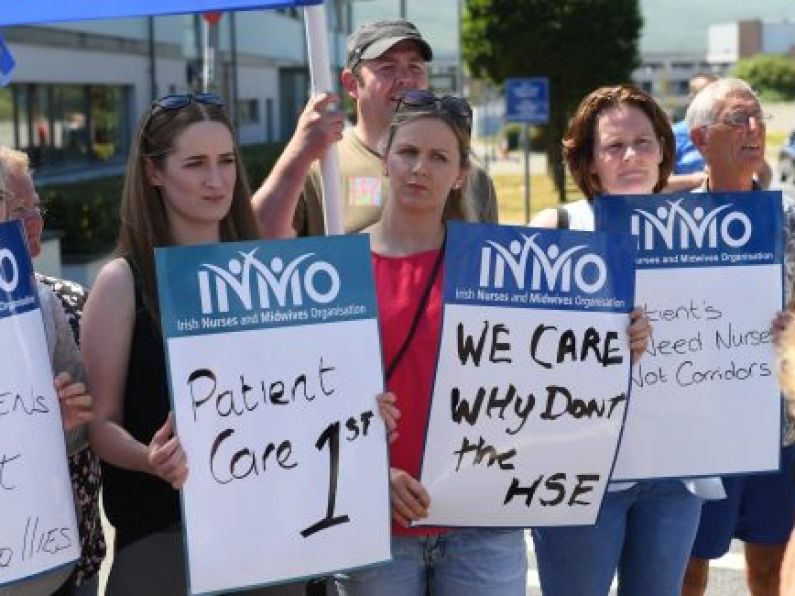The knock-on effect of cancelled procedures and appointments due to the nurses' strike will be felt for some time, the HSE says.
Patients faced with cancellations will not be put to the end of the waiting list but, in trying to reschedule them as soon as possible, other patients will face delays.
Planning for the strike by almost 40,000 members of the Irish Nurse and Midwives Organisation (INMO) has resulted in the cancellation of non-urgent elective procedures for more than 2,000 people while 13,000 have been told not to attend for scheduled outpatient appointments.
A further 10,500 people who were due to avail of community health services - including non-urgent dressings, health screenings, sight and hearing tests and child developmental checks - were also told these services would not be available.
Daycare and day centre services for older people and people with intellectual disabilities are also shutting for the day, leaving more than 3,000 people without services. Nurses will continue to care for people in residential settings but parents and carers looking after loved ones at home will be without their usual supports.
Angela Fitzgerald, national director of acute hospitals, said the HSE recognises that the cancellation of appointments is an emotive issue for patients.
Ms Fitzgerald said: "They won't go back to the end of the queue but obviously in a system like ours, it does displace other patients and that's the big challenge that we're trying to balance. We're giving a commitment to our patients that they will get another slot, and they won't be put to the end of the queue but our ability to accommodate the patients who would normally be due to use those slots will be affected."
Liam Woods, HSE national director of all acute services, added that if there is a further day of strike action: "There will be a cumulative effect which would be quite significant."
Apart from the effect on scheduled appointments and routine care, the impact of the action is expected to be felt most keenly in emergency departments. The HSE has told people to stay away from EDs unless attendance is "absolutely essential", but with local injury clinics closing for the day and GPs surgeries already packed with the usual surge in winter ailments, patients will have few options.
All EDs will be open but will have a much-reduced number of nurses working with inevitable knock-on effects for how quickly patients can be seen.
Crucially, nurses will not be doing their normal triage duties where they carry out the initial assessment on newly arrived patients to determine the order in which they should be treated.
Children's emergency services are exempt from this part of the industrial action and the HSE said talks will continue throughout the day at local level to try to secure exemptions elsewhere but there are no guarantees of further concessions.
Mr Woods said patient safety remains the priority. "Our entire intention is to minimise any risk, recognising that it is not a normal day," he said.
In the event of a major accident plan being activated in any part of the country, however, all nurses will respond.
The HSE has asked patients who have had an appointment or procedure cancelled to refrain from calling the HSE as they will be contacted directly to reschedule.
The strike, due to run from 8am Wednesday to 8am Thursday, is over pay and conditions, amid growing concerns over patient safety and the profession's ability to recruit and retain staff.
Last-ditch talks at the Labour Court that ended today proved unsuccessful with the gap between the two sides considered too wide for any practical compromise to be suggested.
Pickets will be placed at 115 hospitals, primary care centres, community nursing units and health centres around the country from 8am to 4pm on Wednesday.
Tony Fitzpatrick, INMO director of industrial relations, said the union remains open to talks with the HSE that involve "serious proposals" to address members' grievances.
“We are deeply disappointed that the Government still have no serious proposals to resolve this dispute. No nurse or midwife wants to go on strike, but we have been forced into this position by a government that just isn’t listening," he said.
If the dispute continues, there are further 24-hour strikes planned for February 5 and 7 followed by three days of action from February 12-14.






